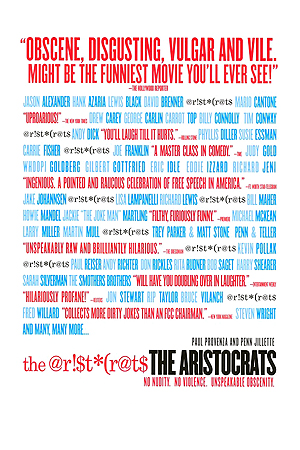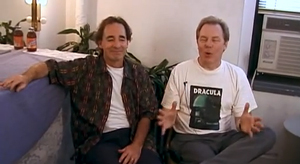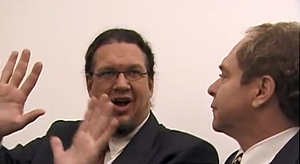
The Aristocrats

THE ARISTOCRATS (MOVIE)
THINKFilm
Original release: August 12th, 2005
Running time: 89 minutes
Directors: Penn Jillette, Paul Provenza
Composer: Gary Stockdale

For as long as there’s been comedy, there’s been the drive to push boundaries of what you can get laughs from, be it the anarchic violence of a Tom & Jerry cartoon or the verbal hammer blow of what Bill Hicks would call “a big purple-veined dick joke.” The history of comedy is a history of societal taboos and hang-ups having a light shone on them for satire, for shock, and for laughs. In 2005, Paul Provenza and Penn Jillette produced a documentary that would focus on the various subjects often considered too close to the bone for audiences, and how they go to play in the conception and delivery of a joke notorious amongst comedians, but largely unknown to everyone else.
There is a joke that virtually every comedian knows. A joke only told by comedians to other comedians … the Aristocrats joke. 100 comedians are interviewed to discuss the joke, what makes it funny, the varied tellings and interpretations they’ve heard, the history of the joke and have a crack at telling it their own way.
It’s frankly a little difficult to discuss the content of The Aristocrats because, honestly, they do a pretty good job of doing that in the movie. The joke itself gets told a handful of times, but the majority of the film is taken up with a multitude of comedians talking about the joke from various different angles. And they all have interesting ideas about it. They openly pontificate on what they think makes the joke work, what subject gets the best laughs, what the limitations of the structure are, the flaws of the joke, what you can tell about the person telling the joke from what subject they spend the most amount of time describing. On a broader level, they use it to talk about the reactions people can have to the more problematic areas of comedy, like incest, or rape, or race, or bodily fluids. All of the comedians seem to be aware that there’s a line in people, but take great pleasure in finding that line and then crossing it. As far as dissection and deconstruction goes, it’s fairly thorough.

The first time I saw The Aristocrats in a theatre, I was one of a little over a dozen people. Only around fifty percent of the audience made it to the end of the film, the rest having walked out before the halfway point. I mention this because I get the feeling that there are two kinds negative reactions that people can have to the film. One is that they’re very offended by what they’re hearing; their limits of taste and decency having been pushed too far. The other negative reaction is that, despite the grotesque images being conjured up, many people will genuinely not like it because they just don’t think it’s funny… Have you ever been told a joke that you didn’t think was funny, and the person telling it then accused you of being “too serious” for not laughing? This is how some will react to the film. In fact, there are a few people in the film that don’t get the joke, that don’t understand why it’s meant to be funny, that simply don’t laugh because they think it’s a bad joke. It’s even something they talk about in the film, before making the point that it’s the absurd journey of the set-up that draws the laugh and not the admittedly weak punch line. You may find yourself spending more time awkwardly waiting to laugh than actually laughing. It’s also quite likely that many of the people who said they never laughed so much at a movie in their lives were trying to avoid being regarded as too un-cool or serious to “get it.”
I laughed a lot the first time I saw The Aristocrats, and still laugh when I see it now, though not as much. There’s a lot of flab to the film, what feels like pointless gurning in an attempt to drag a particular laugh from the audience. This seems to come from a lack of real direction from Provenza. It seems like he thought that if he just interviewed as many comedians as possible about this joke, the direction would reveal itself in the edit and he would be able to construct something of great comedy and great insight from there. Sadly, this is not the case, with so much of the film feeling like padding, a showcase for a vast array of comedy talent. As such, there’s a cacophonous element to the film that it never really gets over, as if they all want to be the one you remember by film’s end by screaming the joke the loudest.
Several of the comedians on show equate comedy in general, and this joke in particular, to jazz: “it’s the singer, not the song.” I’m a big fan of jazz, but I can certainly understand why some people don’t like it. It’s something you need to kind of learn how to appreciate. Really good jazz can take an old standard and build on it, improvising and experimenting, utilising the talents of great musicians to create a single piece of great music that’s very satisfying to hear; really bad jazz can have a group of disparate musicians openly competing with each other for supremacy, turning that old standard into a ragged string of dissonant notes and sounds that’s often quite painful. The Aristocrats film has more of the latter than the  former. There’s an undeniable feeling of some people striving to get the biggest overall laugh with their piece. It’s natural to understand that they would try, but… have you ever seen a stand-up try to flog laughs from a dead joke and get nothing? That’s what it feels like every now and then. The primary rule of comedy is timing and, in truth, this film would’ve been much better served if it lost about half an hour from its running time.
former. There’s an undeniable feeling of some people striving to get the biggest overall laugh with their piece. It’s natural to understand that they would try, but… have you ever seen a stand-up try to flog laughs from a dead joke and get nothing? That’s what it feels like every now and then. The primary rule of comedy is timing and, in truth, this film would’ve been much better served if it lost about half an hour from its running time.
However, there’s still some truly great stuff in there. A silent version of the joke as acted out by Billy the Mime is excellent for its uniqueness; Gregg Rogell’s telling, though broken up in the edit somewhat, is great for the superb way in which he’s structured each part of the joke and the enthusiasm he puts to it; just Bruce Vilanch’s delivery of the phrase “fountains of jism!” is superb; Kevin Pollack’s impression of Christopher Walken telling the joke is brilliant, even if he crumbles before he gets to the end; the animated South Park piece is really very funny; and Sarah Silverman’s abuse confessional is a stellar piece of acting. You will also likely gain a newfound respect for Gilbert Gottfried from the segment of him telling the joke at Hugh Hefner’s Comedy Roast, which served as the inspiration for the documentary itself. And there are many smaller laughs to be had throughout, so you should be able to find a chuckle or three in there somewhere.
The Aristocrats is certainly a very interesting film, which will have a multitude of effects on different people. It has moments of comedy genius, and even manages to tap into what makes comedy such a vital part of society. However, there’s also a lot of the film that is a bit of a slog, with stuff that you just have to get through until the next funny bit. There’s just a lack of overall direction or pace or an idea as to what they want to say that makes it feel like there’s still something you’re not getting about the whole thing. It’s got great stuff in it, but it’s not all gold.

Paul Costello
Paul Costello is a critic, blogger and former film editor with a degree in filmmaking from the University of the West of Scotland. He’s been watching movies for as long as he can remember, and began the process of writing about every movie he owns on his blog: acinephilesjourney.blogspot.co.uk. He’ll be at that for a while. He’s also the resident film writer at TheStreetSavvy.com.
You can follow him on Twitter @PaulCinephile.
© 2022 STATIC MASS EMPORIUM . All Rights Reserved. Powered by METATEMPUS | creative.timeless.personal. | DISCLAIMER, TERMS & CONDITIONS
HOME | ABOUT | CONTACT | TWITTER | GOOGLE+ | FACEBOOK | TUMBLR | YOUTUBE | RSS FEED
CINEMA REVIEWS | BLU-RAY & DVD | THE EMPORIUM | DOCUMENTARIES | WORLD CINEMA | CULT MOVIES | INDIAN CINEMA | EARLY CINEMA
MOVIE CLASSICS | DECONSTRUCTING CINEMA | SOUNDTRACKS | INTERVIEWS | THE DIRECTOR’S CHAIR | JAPANESE CINEMA





